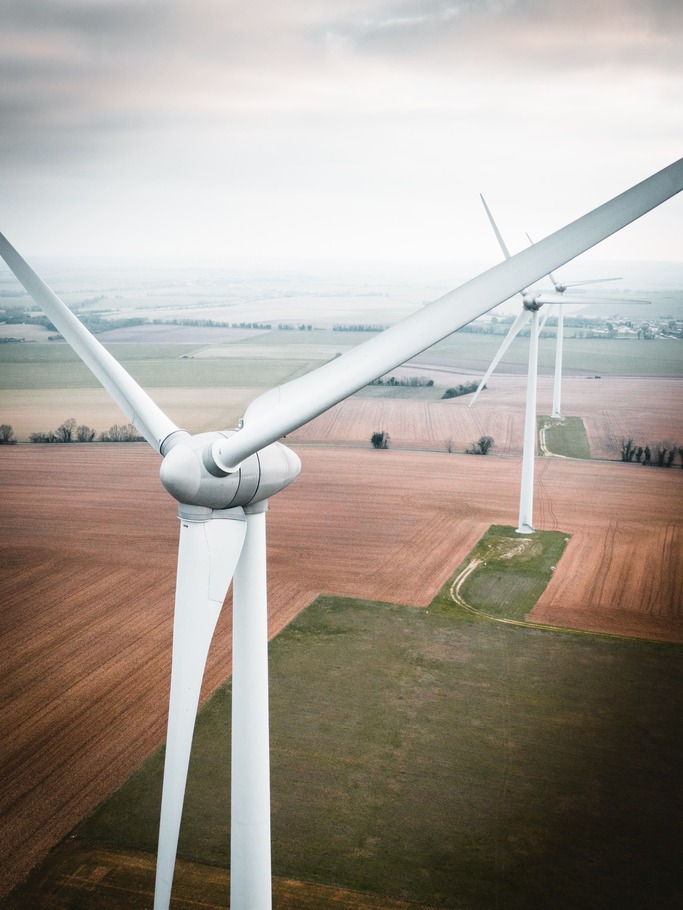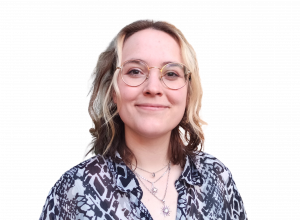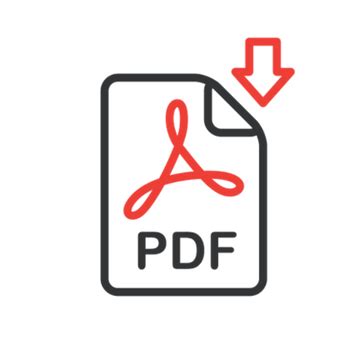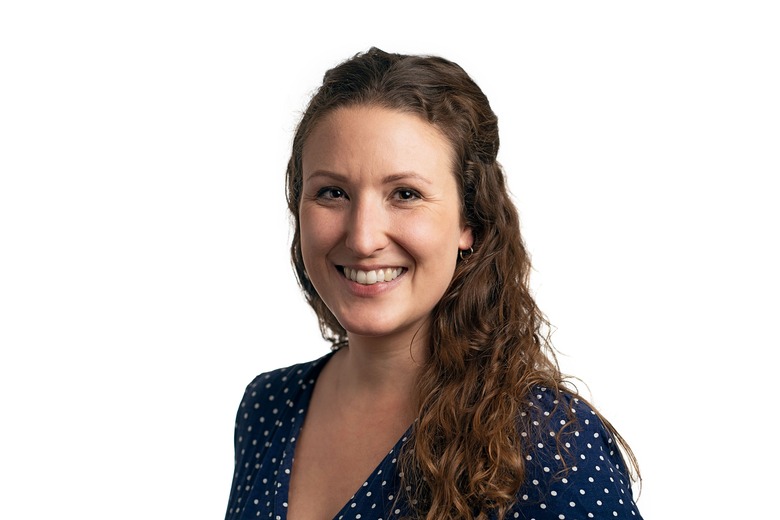Energy Transition Forum 2019 | 28.10.2019 | Bonn
Review
On October 28, 2019, around 80 participants from the energy industry, environmental protection and nature conservation, public institutions, and research and development came together for the 6th Energy Transition Forum of Grüner Strom Label e.V.. In the rooms of the Science Center Bonn, there were lively discussions about current topics of the energy transition. The EnergyAgency.NRW as cooperation partner and the DKB, UnternehmensGrün and the BEE were present as supporters at the event.
Introductory presentations on topics related to the energy transition were followed, also in the morning, by the keynote address by Dr. Simone Peter and an exciting panel discussion. In the afternoon, there were three parallel thematic forums consisting of short input presentations and station discussions. A cozy dinner at the get-together ended the day with nice conversations and good drinks. The focus of the conference this year was:
- Preservation and expansion of renewable energies
- The energy market of tomorrow
- Sector coupling and system integration
You can find a detailed program for the Energy Transition Forum 2019 here as a PDF.
Daniel Craffonara, Managing Director of Grüner Strom Label e.V., opened the event for all participants at 11 a.m. and then handed over the floor to Rosa Hemmers, board member of Grüner Strom Label e.V. and EUROSOLAR e.V.
Rosa Hemmers
Board member Green Electricity Label e.V. and EUROSOLAR e.V.
"20 years of commitment to the energy transition are bearing fruit. Thanks to the investments guaranteed by Grüner Strom-Label, numerous sustainable projects have been made possible. Since 1998, approximately 65 million euros have been invested in more than 1,300 energy transition projects.
The welcoming words of Rosa Hemmers were followed by the welcoming address of Lothar Schneider, Managing Director of EnergyAgency.NRW, who made clear the relevance of the event.

Lothar Schneider
Managing Director EnergyAgency.NRW
"The energy transition is a task that we can only master together. That's why contact among the many players is important. We need to coordinate and renegotiate the rules, the framework of our future living and doing business together."
The welcome was followed in the morning by substantive presentations and a keynote address on the topics of Tal.Markt, climate-neutral urban neighborhoods, energy transition and renewable energies.
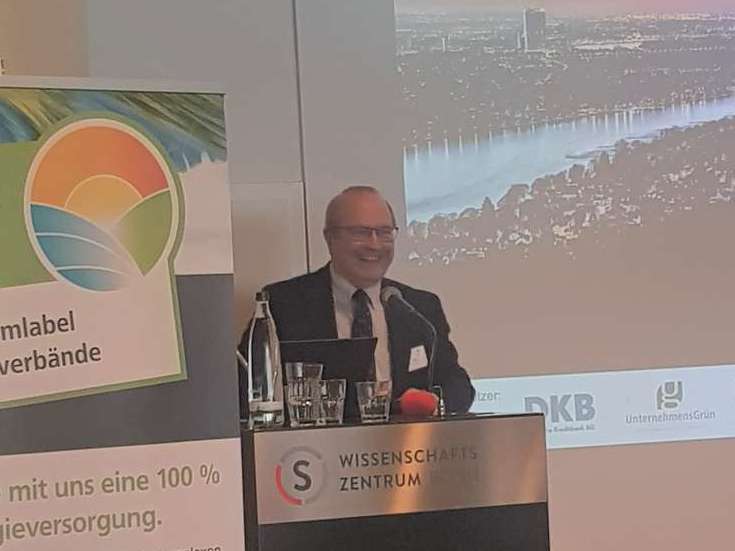
Thomas Daubner
WSW Energy & Water AG
In his presentation, Thomas Daubner from WSW Energie & Wasser AG gave an insight into the newly developed product platform Tal.Markt: Peer-to-peer concepts in the energy market.
"Since April 1, 2019, the platform has been available nationwide, which means that marketing of regional electricity is possible everywhere and thus also increases the acceptance of renewable energies locally."
He explained that it is a blockchain-based trading place for green electricity: "Tal.Markt - da entscheide ich" ("Valley.Market - I decide") is the concept's slogan. Regional electricity producers offer 100 percent green electricity at individual prices, among which consumers can choose several at a time and combine them individually. The producers include not only associations, cooperatives or tradespeople, but also private individuals. One example is the Schepershof. For 40 years now, the people at Schepershof, which operates biodynamic agriculture in the Windrath Valley, have had sustainability at heart. Therefore, a wind turbine, with an output of 55 kilowatts, has been operated since 1991, and a photovoltaic system, which feeds around 14,000 kilowatt hours of solar power into the local power grid annually, since 2006.
"The individual electricity account with daily consumption overview provides transparency and cost overview."describes Daubner at the end of his presentation.
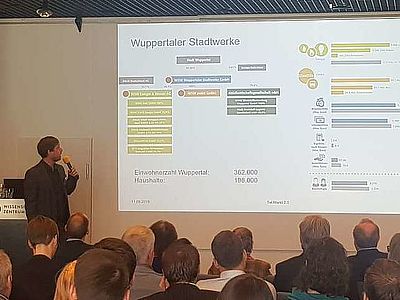
Thomas Daubner gave an insight into the newly developed product platform Tal.Markt: Peer-to-peer concepts in the energy market.
Manuel Thielmann
Polarstern
Manuel Thielmann from Polarstern then presented the climate-neutral urban district of Weststadt Esslingen. This completely new urban quarter is currently being built on the former freight station. Over the next few years, five residential and commercial buildings, private and public green spaces and courtyards will be built there on a total area of 26,500 square meters. The centerpiece in the Future Quarter is the hydrogen electrolysis plant, which converts surplus electricity from renewable generation in the Quarter into hydrogen.
"We are showing that it is possible. We are building one of the world's first electrolysers in an urban neighborhood. The sector coupling and storage of a surplus production of renewable energies in the future will be tested in this way."
As part of the lighthouse project, Neue Weststadt Esslingen, the newly founded operating company of the electrolysers, Green Hydrogen Esslingen GmbH, even won first prize this year in a competition organized by the German Sustainable Building Council (DGNB).
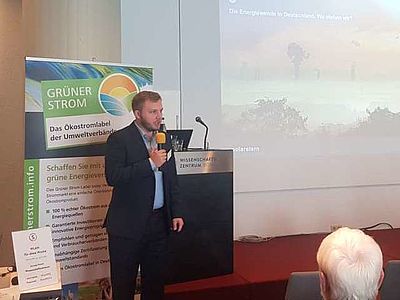
Manuel Thielmann's presentation was about the climate-neutral urban quarter: Weststadt Esslingen
Dr. Simone Peter
President of the German Renewable Energy Federation (BEE)
After the lunch break, Dr. Simone Peter, President of the German Renewable Energy Federation (BEE), gave her keynote address. She emphasized that the energy transition will only succeed through the interaction of actors who are open to new ideas, break with old convictions and who consistently demand a renewable energy future. However, it is not only the diversity of actors and decentralization that play an important role as central goals, but above all politics has a duty. Whether it is for sector coupling, tenant electricity, the transformation of transport or the period after the Renewable Energy Sources Act (EEG) - politics must provide guard rails for fair competition and an energy transition 2.0:
"There is no reason to slow down the energy turnaround, because we have the domestic potential for solar, wind, bioenergy, hydropower, geothermal and environmental heat, meanwhile a huge range of technology to exploit renewables in all sectors, and we have the doers! - Many private individuals, farmers, cooperatives, small and medium-sized enterprises, many a municipal utility, have taken over energy production. We want to further democratize energy production, because it invites people to participate - if the framework conditions are right! Politicians must put the framework back on its feet.
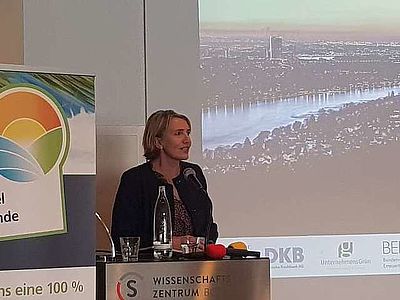
The keynote speech by Dr. Simone Peter
Debate on the topic: "Energy transition - stagnation, regression, progress?"
The morning was rounded off by a debate on the topic: "Energy transition - stagnation, regression, progress? Dr. Thure Traber from the Energy Watch Group, Dr. Katharina Reuter from UnternehmensGrün and Dr. Jürgen Weigt from the Verband kommunaler Unternehmen e.V. debated the current state of the energy transition.
"There's no point in tinkering with emissions trading for years now to find out what's already known today: we can't afford any more investment in fossil plants or even new gas boilers if we want to meet our climate commitments. We will never get there if the old fossil-nuclear system remains at the center of our imagination. Instead, it helps if we think from today's most cost-effective technologies: renewable energies," Traber emphasized.
"The federal and state governments must work together to remove hurdles in land designation and approval of wind and solar farms. Power generation from renewable energies is an important basis for climate protection efforts in the energy sector, industry and transport," argued Weigt.
The political framework conditions necessary for the energy turnaround also played an important role in the discussion:
"The government must stop protecting the economy of the past," Reuter clarified.
She also drew attention to the problem that "a ton of CO2 is cheaper than a pint of beer at the Oktoberfest". This comment left the audience with one laughing eye and one crying eye - food for thought had been set.
After the exciting start in the morning, three parallel topic forums took place in the afternoon. Following short inputs from the speakers, the participants were able to ask the speakers their questions in station discussions.
Preservation and Expansion of Renewable Energies, Tomorrow's Energy Market and Sector Coupling and System Integration
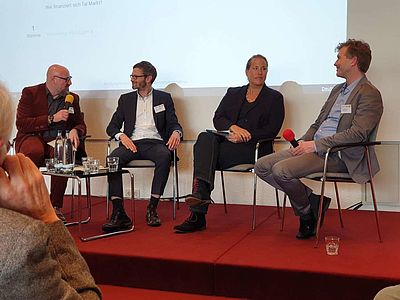
Dr. Thure Traber , Dr. Katharina Reuter and Dr. Jürgen Weigt in the debate on the topic: "Energiewende - Stagnation, Regression, Progress?"
Photo: Bürgerwerke
Topic forum 1
Preservation and expansion of renewable energies. 2020ff
At Topic forum 1 was about the preservation and expansion of renewable energies. 2020ff: And what happens afterwards? The economic viability of many renewable energy plants is no longer guaranteed after the end of the EEG compensation. However, the promotion and maintenance of renewable energy plants is essential for the energy transition. But what does the future look like for green energy sources after the end of the 20-year compensation phase under the Renewable Energy Sources Act (EEG)? Subsidies for existing plants will gradually end from 2021, and many operators will have to ask themselves whether it is still economically viable to continue operating their plants at all. But this scenario also holds new opportunities and business fields for energy suppliers.
Karl Weber, Group Manager Platforms & Processes EDL at the Association for the Economical Use of Energy and Water (ASEW), focused his presentation on the associated opportunities for municipal utilities. "Post-EEG is a relatively unknown problem, would utilities have to act now and offer a solution?", Karl Weber asked the forum participants*. In doing so, Karl Weber presented various opportunities for utilities in his presentation that can be the answer to the post-EEG subsidy era. Among other things, the utility can offer a real electricity community as a solution to integrate diverse plants from the region.
The prospects for regional energy suppliers after the EEG were also at the forefront of the presentation by Mathias Groth, feed-in management and new markets officer at WEMAG AG. According to Groth, the energy turnaround can be implemented by combining a wide variety of marketing channels, the progress of digitalization and the competitiveness of EEG plants. The municipal utilities would have to continue to master the challenge of digitization and set the course themselves. In doing so, they should remain the central contact and contractual partner for the plant operators on site.
"Alexander Krautz, Team Manager Innovation & Development at Next Kraftwerke GmbH, closed the lecture series with the words: "New renewable plants hardly need any subsidies - the expansion should be accelerated. In his presentation, he addressed the risks of post-EEG marketing and illuminated the framework conditions for a sustainable expansion of renewable plants.
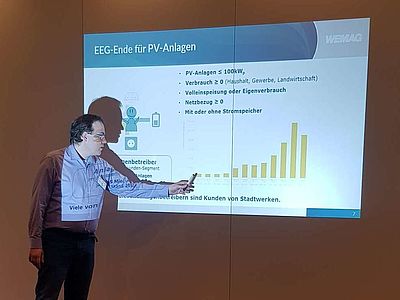
Mathias Groth on "Post-EEG Marketing of Small and Large Power Plants: Prospects for Regional Energy Suppliers".
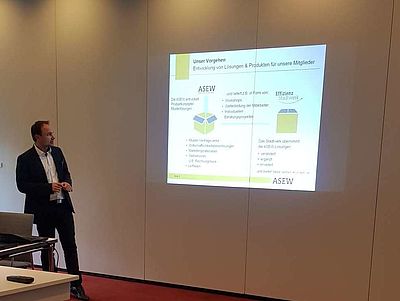
Karl Weber in his presentation on "Post-EEG and energy service: opportunity for municipal utilities".
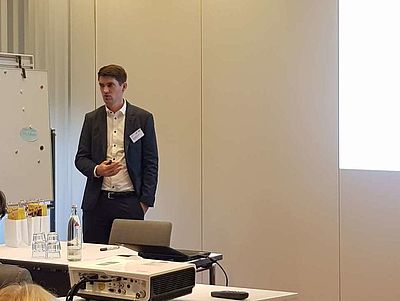
Alexander Krautz talks about "Post-EEG: Marketing Concepts for Renewable Energy Plants".
Topic forum 2
The energy market of tomorrow
Eva Hauser, Deputy Scientific Director of IZES gGmbH, led the Topic forum 2: The energy market of tomorrow with the presentation on Market Analysis Green Electricity II: Possible Contributions of the Voluntary Green Electricity Market to System Transformation. She made clear that a multiplication of today's installed RE capacity is an important target to be able to reach the 1.5°C target. In this context, however, a (largely) risk-free form of RE power tariff does not yet seem substitutable from today's perspective. Several policy instruments are needed - the voluntary green power market has to and will reach its peak in the near future.
"Regional electricity promotes acceptance for the expansion of RE", with these words Stefan Lank, Head of Integrated Services at RheinEnergie Trading GmbH, continued the series of lectures. The sale of regional electricity is the means to create broad-based social acceptance for the expansion of renewable energies and low-CO2 generation. Lank explained how such a regional power product could work in practice, using "stromodul" as an example. The regional electricity platform is designed to bring producers and consumers together and to meet the trend toward sustainability and digitization. Electricity customers can compile their electricity supply individually on the web-based platform. A transparent presentation and the traceability of regional electricity purchases can thus become more apparent to consumers.
The importance of considering regional conditions also became clear in the next presentation. Malte Zieher, board member of Bündnis Bürgerenergie e.V., spoke about the EU requirements for peer-to-peer trading and the implementation in German law. "People must finally be able to sell their self-generated solar power in a simple way in the neighborhood. With the new EU specifications, this could soon become a reality," Zieher said, describing developments in the market. For example, "green neighborhood electricity" could be electricity from a RE plant of any size, sold by self-suppliers acting individually or collectively, using the public grid through peer-to-peer business arrangements, to a customer within a maximum radius of 4.5 kilometers.
After the thematic consideration of the external factors for tomorrow's energy market, Dr. Katharina Reuter, Managing Director of UnternehmensGrün e.V., provided impetus for changes within the company itself. "Tomorrow's energy market relies on a grandchild-friendly economy. We must no longer protect the companies and business models of the past. Wirtschaft For Future takes sustainability seriously across the board - for this, companies can also use the Sustainable Development Goals as guiding stars," Reuter said. For example, companies need to incorporate holistic sustainability into their DNA. Within the framework of the Sustainable Development Goals, this holistic approach encompasses 17 areas in which a company can make valuable changes and adjustments.
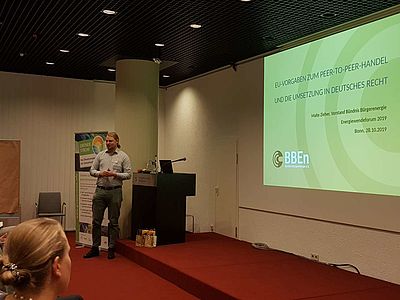
Malte Zieher explains in his presentation EU requirements for peer-to-peer trading and the implementation into German law.

In station discussions, there is lively debate about the individual presentations
Topic forum 3
"Sector coupling and system integration"
The Topic forum 3 was held on this day under the motto "Sector coupling and system integration". The energy transition can only succeed together, both on a human and on a systemic level. Elementary for this change is the switch to renewable energies - not only in power generation. Traditionally tailored solutions for individual sectors such as heat, transport and industry have long been outdated and instead holistic concepts need to be developed. These concepts were made more tangible through four exciting presentations and subsequent discussions in station talks.
What is actually sector coupling? Dr. Eckehard Büscher, Head of Energy Management at EnergyAgency.NRW, gave an overview of this at the beginning of the forum.
"Sector coupling is the necessary basis for a successful energy transition. Electricity turnaround is not enough - we also need the heat turnaround!" says Büscher.
In addition to the principle of sector coupling, Büscher also discussed the provision of useful energy for heat from renewable energies in his short presentation.
In the next presentation, Dr. Dietrich Schmidt, Head of the Electricity-Heat Systems Department at the Fraunhofer Institute for Energy Economics and Energy System Technology, shed light on how sector coupling can be implemented right on one's own doorstep.
"Climate protection is a task for the century and requires all efforts for a sustainable energy supply - with centralized and decentralized structures and solutions!", Schmidt emphasized. In this context, he sees cities and municipalities, municipal utilities and regional EVU as the main focus for the implementation of sector coupling. Alongside decentralized heat pumps, heat grids are a key element in decarbonizing the heat supply.
In addition to energy supply, environmentally friendly mobility is also a key issue in the context of sector coupling. Dr. Ernst Raupach, Head of Marketing, Electromobility at NATURSTROM AG, presented e-mobility concepts in implementation to the participants*.
"The decarbonization of the transportation sector has not yet begun. It seems like we need disruptive solutions here now," Raupach notes. With fewer and smaller vehicles, he says, the quality of life in cities can be improved. For the transportation needs of the future, not only renewable fuel is needed, but also drastically more efficient vehicles. Thus, "Donk-EE" was launched. Europe's largest e-load bike sharing system provides 60 high-quality e-load bikes in Cologne - powered by high-quality green electricity, of course. An exciting solution that could even be further developed through the talks and discussions with the participants of the forum.
Before going into the deeper discussion of the topics within the stations, it was again necessary to take a look into the future. Dr. Günter Herdin, Managing Director of PGES GmbH, spoke about the use of synthetic gases for future supply security. According to Herdin, decarbonization of the energy supply together with the phase-out of nuclear power is crucial to keep the greenhouse effect within the limits of the Paris climate summit. To represent the necessary storage reserves, only hydrogen or the production of SNG (synthetic natural gas) is possible according to the state of the art. Gas engines have a property here that allows for a very large variability in fuel composition. "Overall, the gas engine will play a key role in the energy transition, both in terms of efficiency and cost," Herdin emphasized.
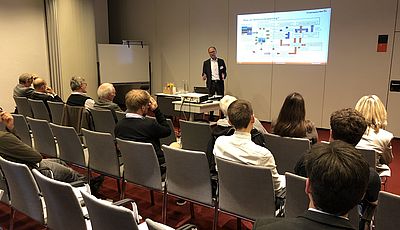
Dr. Eckehard Büscher in his presentation on "Sector coupling in Germany
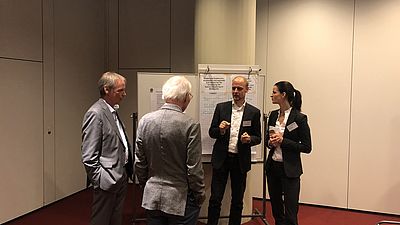
Dr. Dietrich Schmidt in a station talk on the topic of "Energy system city: sector coupling in urban space".
Conclusion of the event
At the end of the event, all participants of the Energy Transition Forum came together again and the respective moderators of the thematic forums presented the results of the presentations and discussions. The Energy Transition Forum was followed by a get-together. Here, as at lunch and in the thematic forums, all participants had the opportunity to talk to each other and make new contacts.
We would like to thank the EnergyAgency.NRW and all participants, moderators and speakers for a successful Energy Transition Forum 2019.
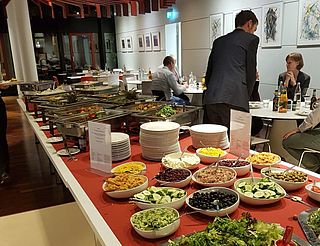
The day ended with nice conversations and good drinks at a cozy dinner in the get-together
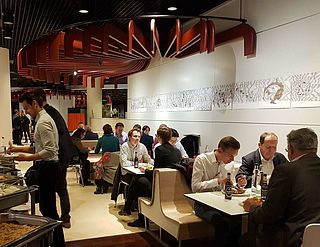
The participants took the opportunity to exchange ideas and make new contacts.
Together for the energy turnaround
Your contact person

Melanie Alberts
Head of Communication & Marketing
All info about our last events to read Past events

Energiewende2Go: Balcony power plants for more climate protection
You want to operate a balcony power plant yourself? We will answer all your questions about balcony modules in the free online event with Netzwerk Energiewende Jetzt e.V.
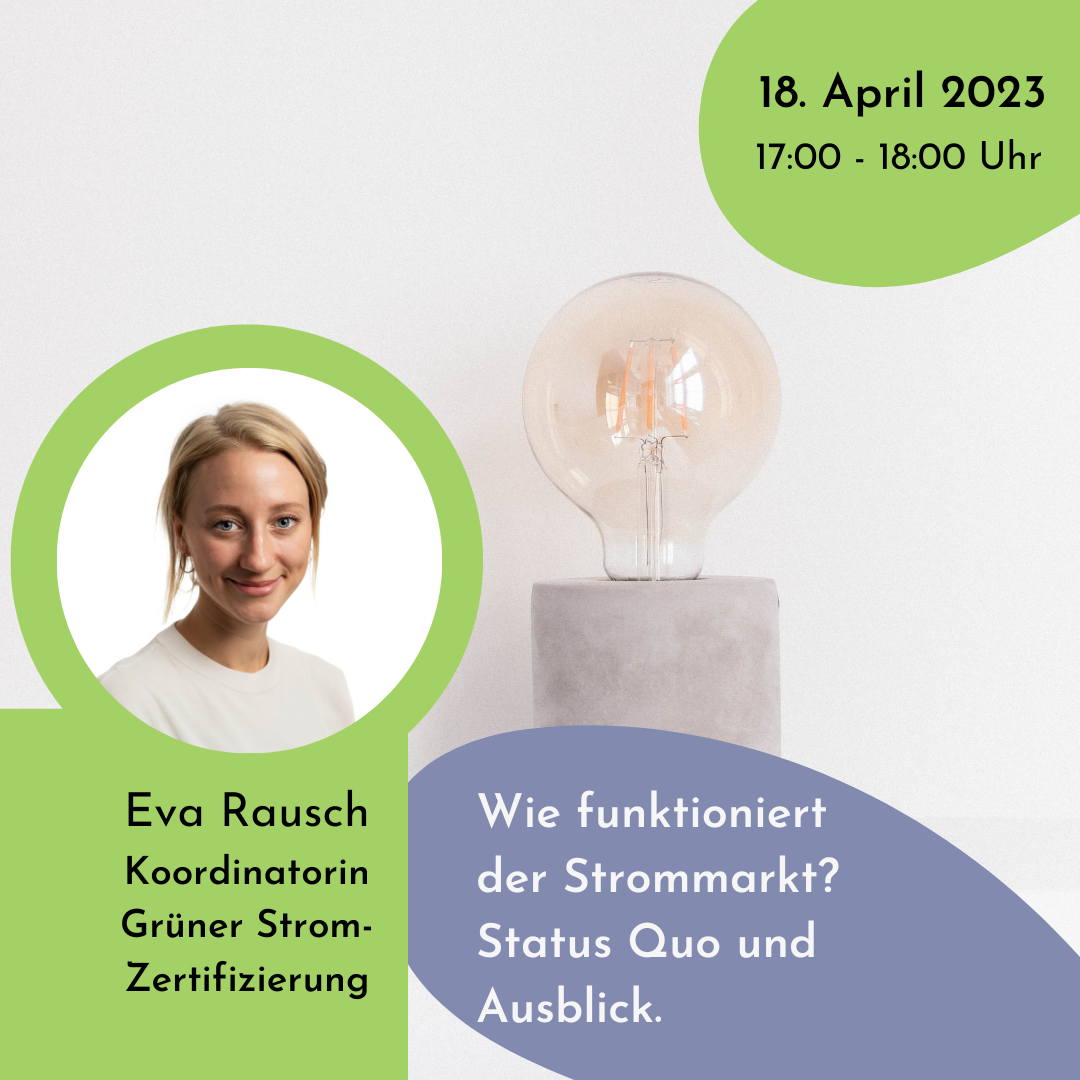
Energiewende2Go Event: Electricity Market
The price of electricity is at a historically high level. This is primarily due to the war in Ukraine and the lack of gas supplies from Russia. However, the price increase also affects those who have been purchasing electricity from renewable energies for years.

ENERGY TRANSITION FORUM DIGITAL 2021
The year is coming to an end and our five energy transition forums are over. Together with Energiewende supporters, we took a look at the energy world of tomorrow and created a platform for the exchange of practical experiences, perspectives and ideas.
